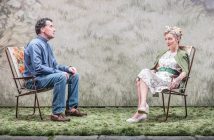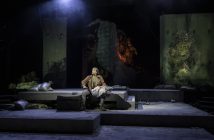I had thought that the Terence Rattigan revival, which seemed to begin around 2009 and has seen a series of superb stagings of his greatest plays, might now have come to something of an end, but there’s no doubt that ‘Old Terry’ was a consummate theatrical craftsman. Joseph Fiennes should make an intriguing TE Lawrence in his semi-forgotten play Ross, which is about to be revived at Chichester, but the greater event is the superb Helen McCrory being reunited with her Medea director Carrie Cracknell at the National, for what’s probably the finest production so far to have taken place under the Rufus Norris regime. That it plays it far safer than advance publicity had indicated is no bad thing.

Whether Rattigan intended The Deep Blue Sea to be a semi-concealed account of a fling that he had with a younger man which resulted in his inamorata killing himself or not, there’s no doubt that the story of a middle-aged judge’s wife, Hester Collyer, and her desperate passion for a younger man, the feckless former fighter pilot Freddie Page, is a remarkably rich and dramatically compelling one. It’s different to many of his other plays in that it’s a chamber piece with a small cast, set entirely in one room in a Ladbroke Grove lodging house (prior to the area’s gentrification, of course), and revolving as much around inaction as it does around events. And yet it’s one of his most enduring works, offering a decent claim to be regarded as little less than the English equivalent of Hedda Gabler.

McCrory, who is incapable of giving a bad or boring performance on stage, is especially magnificent here, simultaneously conveying the crushing lack of spirit of a woman who has been kept down by men in all their different ways her entire life, but hinting at an inner life that appears in brief moments of passion, fear or rage. She’s ably matched by a fine supporting cast that includes Tom Burke, so memorable in the recent TV adaptation of War and Peace, as a man barely worth losing sleep over, let alone becoming suicidal over, and Peter Sullivan (who coincidentally bears a close resemblance to Rattigan) as her husband, a mix of kindness, compassion and patriarchal control who is unable to understand why his wife would wish to flee a life of dinner parties and gossip for a bed-sitting room in West London. The character of the disgraced Miller – struck off for what, it’s very heavily hinted, is homosexuality – is finely brought to life by Nick Fletcher, and there is an amusing cameo of a far from normal marriage from Yolanda Kettle and Hubert Burton.

Working from an interestingly odd set – shades of Death Of A Salesman – from Tom Scutt that appears to depict an outsized version of the flat, Cracknell uses the odd trick of distorted sound to attempt to depict Hester’s mental state, but otherwise this is a surprisingly straight and unflashy production of the play. Which is probably for the best, given that Rattigan doesn’t need to be gussied up with pointless trickeries of director’s theatre. Instead, his penetrating insight into the human heart, in all its foibles and disappointments, remains as brilliant as it’s ever been. Make plans to see it.
The Deep Blue Sea at the Lyttleton Theatre until Wednesday 21st September 2016. Running time approximately 2 hours and 40 minutes including an interval. Production images by Richard Hubert Smith. For more information and tickets visit the website.




